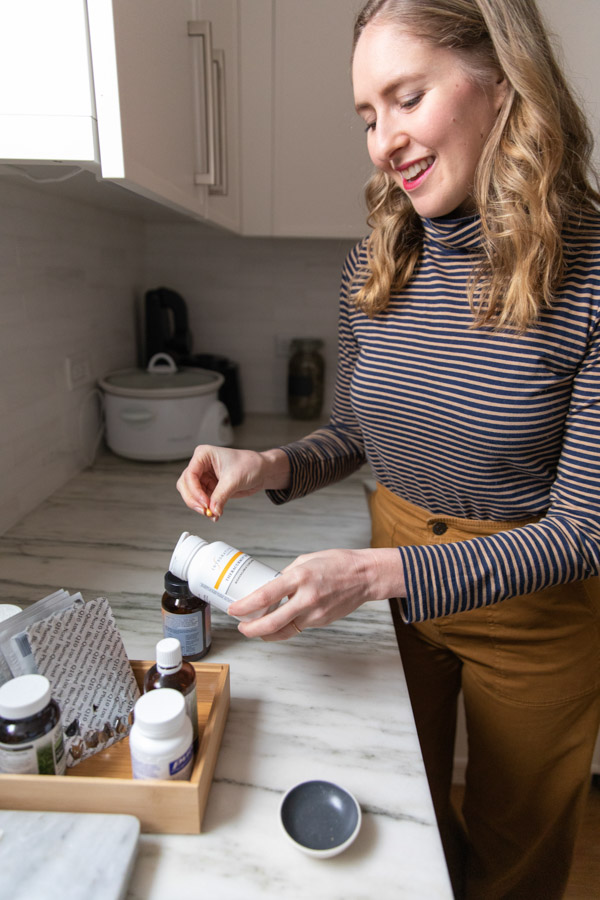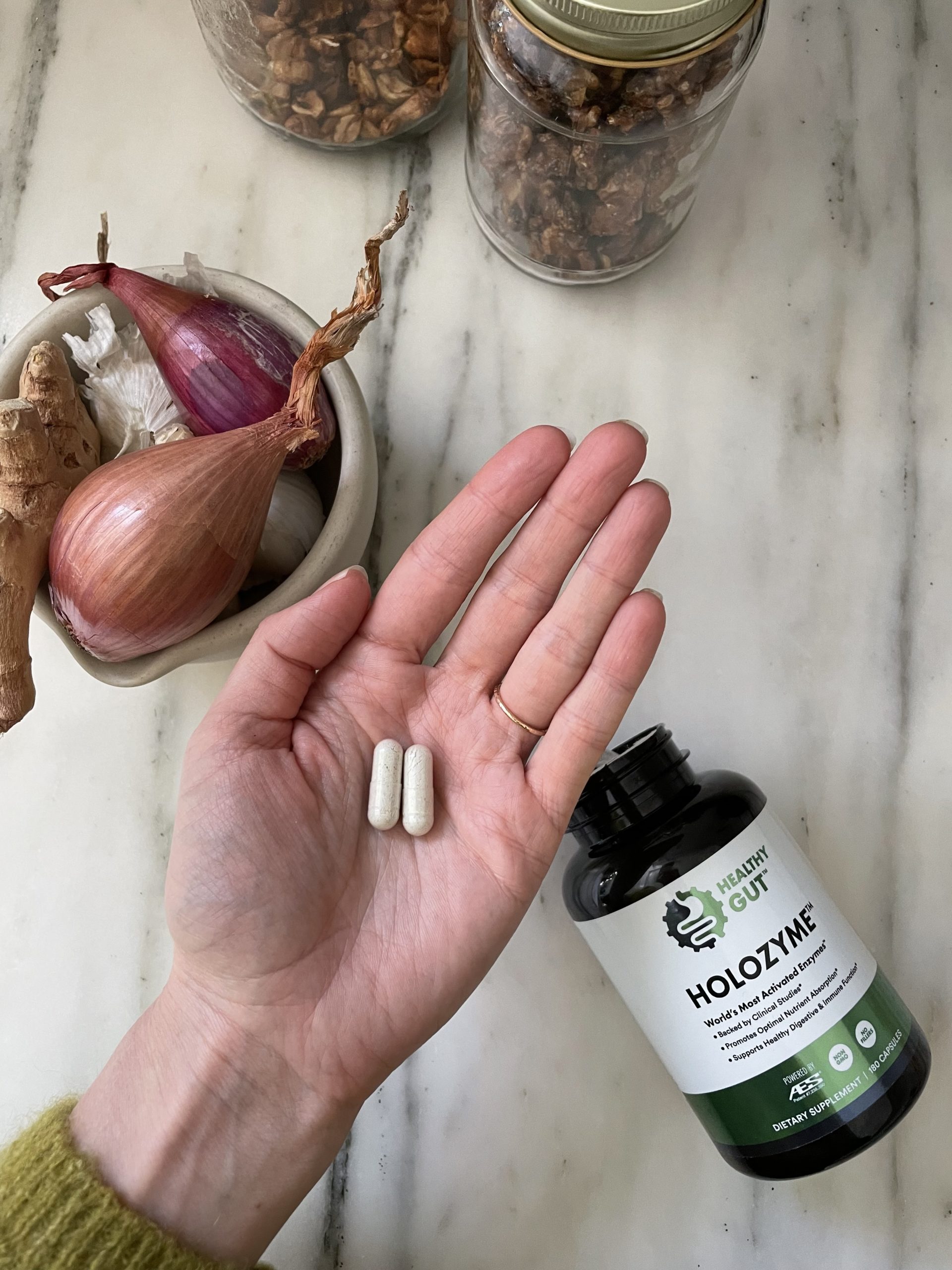The Best Digestive Enzymes Supplement for IBS and SIBO
It seems like almost every week during my Q&A’s someone asks me about the best digestive enzymes, and which supplements I specifically recommend for people with IBS and SIBO.

When I first started my SIBO treatment way back in 2017, one of the first things my doctor did as an adjunct to the herbal antimicrobials was make sure I was taking digestive enzymes with every meal.
As I explain in this post about natural SIBO treatments, so much about easing symptoms and beginning the slow process of healing your gut is making sure you don’t add insult to injury.
For many people, that means taking on some sort of special SIBO diet, often a low FODMAP diet. But it also means that no matter what you’re eating, you need to be setting your digestive system up for success.
Even if you don’t have an allergy or intense sensitivity to certain foods, you might not have the digestive fire to process them on your own.
This is one of the reasons why in my book, SIBO Made Simple, I give so many tactics for improving HOW you’re eating – the things that help your digestive outcome no matter what is on your plate. Because often the how for people with IBS and digestive issues is much more significant than the what.
In a nutshell, a few of those things include: chewing your food thoroughly, meal spacing (giving your digestive system downtime between meals), choosing cooked, pureed foods over raw, cold dishes, not eating too close to bedtime, and revving up your stomach acid before meals.
You can find more in depth explanations for any one of these in chapter 3 (page 101) of my book. But let’s chat for a second about that last piece of the digestive puzzle and why digestive enzymes can be such an important strategy for people with IBS and SIBO, not just for treatment, but as a lifestyle choice moving forward.
For starters, a few major SIBO root causes are low stomach acid or a lack of digestive enzymes. Stomach acid is responsible for killing bacteria before it has a chance to make it to the small intestine. But even if it makes it past this leg of the labyrinth, you should be able to rely on your body’s other antimicrobial substances to neutralize unwanted visitors.

While the large intestine is primarily made up of water, the environment of your small intestine is meant to be quite acidic. It gets it’s digestive enzymes from the pancreas and the gallbladder, which is responsible for the bile that helps break down fats. If you have any sort of dysfunction with your pancreas or have had your gallbladder removed, as many women have, besides the structural implications of that abdominal surgery, you’re also going to be missing those essential digestive substances going forward.
If you fall into one of those camps, it’s definitely important to get your hands on the best digestive enzymes. But even if you’re not and have developed IBS or SIBO for other reasons, adding some extra work horses to your small intestine can help make sure that food is broken down sufficiently.
While your food choices on the diet front probably didn’t cause your SIBO and, therefore, will probably not be responsible for it coming back, the issue of having undigested food hanging out in your small intestines is not going to help your recovery or prevention.
If you’re not breaking down food properly, it means there will always be an ample food source for bacteria to go to town on if they managed to make it past your stomach acid and, thanks to other root causes, are not being promptly swept down to their rightful home in your large intestines by the migrating motor complex.
I’ll talk a little bit more about the best digestive enzymes for IBS, how often you should take them, and what foods they are best for below. But hopefully the explanation above gives you more of an understanding about why this basic supplement can be such an important part of your IBS toolkit.
With health and hedonism,
Phoebe
FREQUENTLY ASKED QUESTIONS ABOUT DIGESTIVE ENZYMES
How Do Digestive Enzymes Work?
Digestive enzymes, in the simplest terms, help us break down our food into much smaller pieces, so the nutrients in our food can easily be absorbed in the gut. The process is more complex than this and several things can go wrong. Which is why we often need additional support. Anyone with digestive complaints, food intolerance, brain fog, skin issues, or chronic illness might benefit from taking digestive enzymes.
When you drill down to evaluate the different types of enzymes needed (from lactase to sucrase), it can become quite intricate. Not of these enzymes work alone in the body, and the best digestive enzymes supplements will solve for the these team issues.

What is the best digestive enzymes supplement for IBS?
I have tried many different brands over the last four years, and for a while, didn’t really feel like any one did more for me than the other. They all helped somewhat.
But recently, I came across this supplement that uses slightly different technology and includes full pH coverage plus complex carbohydrate and polyphenol breakdown support.
So let’s talk for a minute about what can go wrong with digestive enzymes.
All animal made enzymes like pancreatin are naturally created with the proper mineral cofactor attached to the enzyme. This means that there must be the right mineral nearby to “turn-on” the enzyme for it to work in the body.
The lack of activation in some brands of digestive enzymes is why they might not work for you as well. There is also the question of how a formula solves for PH.
All enzymes work on a bell curve in relation to the pH of the environment. Pancreatin for instance works between a pH of 6-8, while vegetarian enzymes function best between a different range. So to cover the entire range using animal or plant derived enzymes the digestive enzymes supplement must contain multiple strains.
Lastly, there are 3 major layers of enzymes in our gut: pancreatic, brush border, and microbiome. A common failing in the creation of enzyme formulas is focusing on only one class, or even one enzyme in particular, like lactase.
For IBS and SIBO folks in particular, complex carbohydrates in the FODMAP acronym often cause GI issues. These are often helped by the microbiome enzyme class, which is not found in all digestive enzyme supplements.
These are some of the many reasons I was impressed by the research and formulation of HoloZyme. It includes all three levels of enzymes:
- Pancreatic (Protease, Amylase, Lipase)
- Brush border ( Lactase, Maltase, Sucrase)
- Microbiome enzymes: (Cellulase, Xylanase, Phytase, Alpha Galactosidase)
And together these ingredients support the full breakdown and absorption of a diverse range of foods: protein, fat, and carbohydrates, especially the kind that often give people trouble (like beans). It even helps break down salicylates.
If you want to give HoloZyme a try, they gave me a code PHOEBE so our readers can take $15 off!
What is the best time to take a digestive enzyme?
Typically, digestive enzymes should be taken right before or at the beginning of a meal. This helps with the breakdown of food. But can also take an enzyme later on if you feel your meal just isn’t digesting well enough.
The makers of HoloZyme reported that anecdotally, they’ve found that 1 extra capsule can make all the difference for some digestive tracts, especially if taken at night before bed on an empty stomach.
As I mentioned above, not eating too close to bedtime is an important tactic for IBS and SIBO people because a sluggish digestive system means you’re at greater risk for having undigested food hanging out in your small intestines overnight.
When you’re sleeping, your digestive organs slow down and your liver focuses on other tasks, like cleaning your blood. Many studies have shown that the migrating motor complex is much less active at night. So again, you want to make sure that any lingering food debris gets swept away before then, or at the very least, add an enzyme to help break things down for you while your body is literally sleep on the job.
If you’re someone experiencing bloating, heartburn, gas, loose stools, food sensitivities, pain etc., this might be a tactic to consider.
Are digestive enzymes a temporary or forever supplement? Are they safe to take long term / every day? Does your body become dependent?
Enzymes are safe to take long-term although not everyone will need to do so. You can adjust the number of capsules you take to meet the challenge of the meal you are eating. For example, if you struggle with fats and fiber, and you are eating a meal higher in either of these, then you can increase the dosage for additional support for that meal.
Your body will still make its usually stores of enzymes. These supplements will just be adding more ammo to the reserves. However as we age, our body’s own enzyme production does naturally decline. Taking digestive enzymes systemically can be a helpful “anti-aging” tool as far as your gut is concerned.
Personally, after my first year of SIBO treatment and recovery, I stopped taking digestive enzymes with every meal, mainly out of laziness. But I try to include them if I’m eating something richer than usual or a meal that includes one of my problem ingredients (legumes, cauliflower, cashews, to name a few).
They are also a HUGE part of my SIBO prevention tactics when I’m traveling and more prone to bouts of IBS or getting an unwanted microbe into my system.
Are there any adverse side effects of digestive enzymes?
Most digestive enzymes are well tolerated. But there can be scenarios where you might want to start with a smaller dose and ramp up slowly.
For someone with SIBO or microbes used to feasting on undigested food, reducing these food sources could result in die-off symptoms. If you’re a super sensitive person dealing with SIBO treatment, keep this in mind.
What is the difference between HCl pepsin and digestive enzymes? Should they be taken together?
Though some digestive enzymes contain betaine HCl or pepsin, they have different functions, and may require some individual experimentation to see where you are lacking.
For this reason, it’s beneficial to take HCL/pepsin supplements separate from digestive enzyme supplements, rather than as a combination product. Separating out the HCL from your digestive enzyme blend allows you to figure out if you actually need HCL and what your ideal dose is (if you have low stomach acid, that dose will likely be much higher than what is included in a digestive enzyme blend).
That said, many people who have low stomach acid and are also low in digestive enzymes and need support there too. Some people may actually only need a small amount of supplemental HCL, but a good portion of enzymes. If you want to experiment, I also recommend Healthy Gut’s other product HCL Guard.
What kinds of foods do digestive enzymes help with? Should the supplement approach be different for meat and fat heavy meals?
Again, this depends on which digestive enzymes are included in your supplement. One of the reasons I like this one is because it includes a wide array that can tackles all food groups.

If fat malabsorption is something that you struggle with in particular, oxbile is regarded as a more targeted supplement for your needs
There’s no harm in taking a complex formula, but similar to the HCL question, if you’re struggling in one particular area for sure, it might be worth exploring a targeted enzyme for that problem so that you can make sure you’re getting adequate support in addition to these more broad complexes.
Are there any particular conditions or concerns that digestive enzymes are particularly beneficial for?
Well, I’ve explained why digestive enzymes are so important for people with IBS and SIBO! But I would add that if you have any sort of liver, gallbladder or pancreatic dysfunction, you’re going to want to make up for those fallen work horses somehow.
There you have it! I would be so curious to hear what digestive enzyme brands you’ve found helpful in the comments. If you want to try Holozyme or any of the other products in the Healthy Gut line, you can use my code PHOEBE for $15 dollars off your order.
Please drop any more questions about digestive enzymes below!
